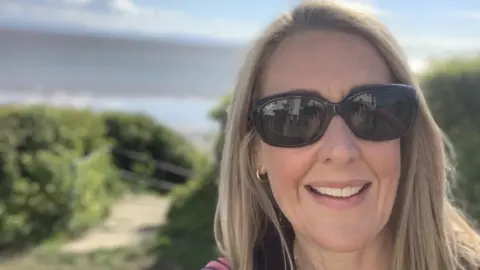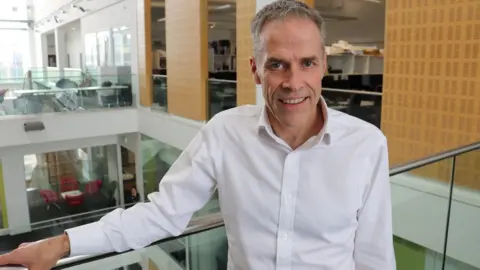Mental health: Online PTSD therapy as effective as face-to-face
 Sarah
SarahOnline therapy is as good at treating Post-Traumatic Stress Disorder (PTSD) as face-to-face cognitive therapy, according to a study.
It said online care could save the NHS time, money and cut waiting lists.
Named Spring, the internet version is a third of the length of a standard cognitive therapy course, which is designed to help patients managing problems by changing behaviour.
The treatment has already been rolled out across parts of the NHS in Wales.
Parts of NHS Scotland will use it from August, with talks ongoing with other parts of the UK's health service.
The findings, seen exclusively by the BBC, are being published later in the British Medical Journal.
They showed at 16 weeks more than 80% of people who used the online course and had face-to-face treatment no longer had PTSD, giving evidence the new method was just as effective as cognitive therapy, the study's authors said.

Sarah was diagnosed with PTSD by a GP, but with the waiting list for therapy so long, she was offered the chance to be one of the 196 patients on the four-year trial by Cardiff University.
They were split into two groups. The half Sarah was in received the online treatment, the other half had face-to-face therapy.
Sarah, who had been assaulted, said her personality and life changed after the attack.
"I just began to feel very anxious, very withdrawn, I couldn't settle, sleepless nights, went off my food, wasn't eating properly," she said.
"I didn't want to go out but I didn't want to stay at home. I just wasn't myself…. I didn't feel safe anywhere really."
The change affected her relationship with her daughter, she said, which led to her seeking help.
"I remember her saying to me 'Mummy, why are you so sad'?
"That's hard when a small child says that to you. You recognise, 'Yes, I'm not myself I need to get myself sorted out'."
One day she dropped a cup of tea after being startled by her own reflection in the window.
"It was at that point I (realised) I can't carry on like this, I need to get some help."
 Getty Images
Getty ImagesAfter 16 weeks, more than 80% of people in both groups no longer had PTSD.
The study's authors said this was evidence the new method was as effective as traditional cognitive therapy.
A few face-to-face or Zoom meetings with a therapist are still part of the treatment, but far less than usual, meaning treatment is cheaper and reduces pressure on the NHS.
Prof Jon Bisson, of Cardiff University, the study's lead author, said: "The cost of it was significantly less than face-to-face therapy and, obviously with the resource issues within the NHS at the moment, what we want to develop are treatments that are equally effective and cost the NHS less.
"And what we believe is if this treatment was introduced to the NHS we could treat more people in a shorter amount of time therefore the waiting list for such treatments could reduce."
Prof Bisson accepted the treatment may not be suitable for everyone such as those that have PTSD tied to multiple events.
But for people like Sarah whose illness was sparked it by a single incident, it could be life changing.
"I've been completely match fit since I've done the programme," she added.
"It's given my techniques that are so useful in everyday life really, you know in work if I've got an important meeting and I feel a bit anxious it's taught me techniques for breathing and mindfulness."

- FIGHT FOR YOUR RIGHTS: X-Ray returns and they've got your back
- SPOTLIGHT ON THE NHS: Is Covid masking a bigger problem with our health service?

